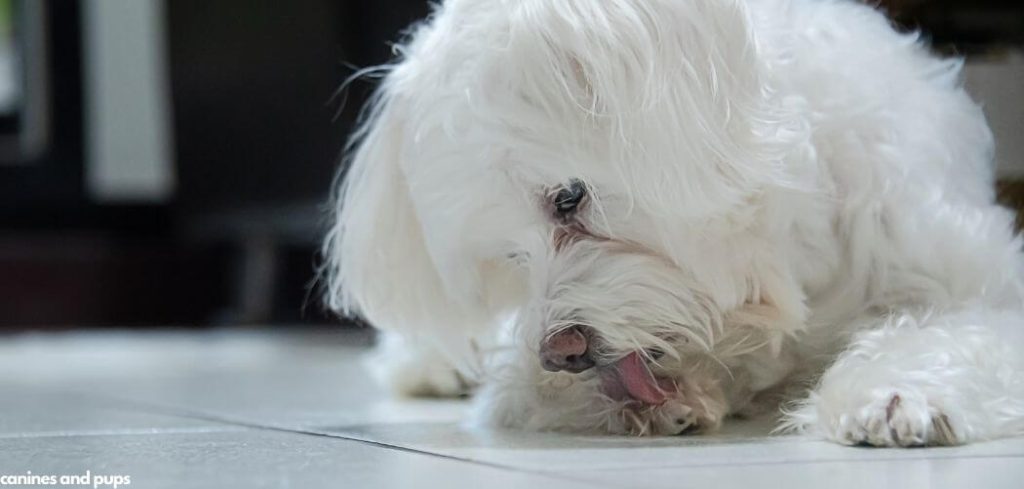It can be alarming to see your dog constantly chewing or licking around their anus. While it may seem like a minor irritation, this behavior often signals discomfort or another underlying health problem.
We outline the common reasons why a dog may chew around their anus, what you can do, and when to seek veterinary help.
Dog Chewing Around Anus — Why It Happens
When a dog chews around their anus, it is usually due to irritation, pain, or discomfort in the anal or perianal area. The most common culprits include anal gland problems, intestinal parasites, allergies, or skin infections. Some dogs may also chew excessively after grooming, due to irritation from clippers or shampoo. In other cases, more serious conditions such as tumors or rectal issues could be responsible.

Dog Chewing Around Their Anus: Common Reasons
Anal Gland Impaction or Infection
Dogs have anal glands on either side of their anus that release a scent during bowel movements. When these glands become impacted or infected, they cause significant irritation.
A dog with anal gland issues may scoot across the floor, lick excessively, or chew around their anus. If infection sets in, you might notice swelling, redness, or a foul-smelling discharge.
Left untreated, abscesses can form, which are painful and require veterinary drainage.
Read more: Dog Excessively Licking Privates (Here’s Why)
Intestinal Parasites
Worms such as tapeworms, roundworms, and whipworms often cause irritation around the rectal area. Tapeworm segments in particular may be visible as small rice-like particles near the anus or in stool.
The itching from worms leads dogs to chew and lick around their anus to try to relieve the discomfort. Heavy infestations may also cause weight loss, diarrhea, or a dull coat.
Parasite control is essential both for your dog’s health and to prevent transmission to other pets or humans.
Allergies and Skin Irritations
Food allergies, environmental allergens, or contact dermatitis can all cause inflammation around the anus. The skin may appear red, inflamed, or moist from excessive licking and chewing.
Allergic dogs often have other symptoms such as paw licking, ear infections, or recurrent skin problems. If chewing coincides with seasonal changes or diet switches, allergies should be considered as a likely cause.
Fleas and External Parasites
Fleas don’t just target the back and belly — they often congregate near the tail base and anus. Their bites are intensely itchy, leading to chewing and irritation in the perianal area.
In addition to fleas, mites like sarcoptic mange or Demodex can cause localized itching and inflammation.
These infestations can worsen quickly and require prompt veterinary treatment.
Rectal or Perianal Tumors
While less common, growths around the anus can cause persistent licking or chewing. These may include benign tumors like perianal adenomas or more serious cancers.
Tumors may appear as lumps or swellings around the anus. Dogs with these conditions may also strain to defecate or show signs of pain. Because tumors can progress quickly, early veterinary evaluation is essential.
Post-Grooming Irritation
Some dogs begin chewing around the anus after a grooming appointment. Clippers, scissors, or even certain shampoos can irritate the sensitive perianal area.
Mild irritation usually resolves within a day, but if chewing continues or the area becomes inflamed, infection or chemical sensitivity may be involved.
Monitoring the skin closely after grooming can help you determine if irritation is temporary or needs medical attention.
Read more: Dog Keeps Licking Privates After Grooming (Here’s why)
What to Do If Your Dog Is Chewing Around Their Anus
If your dog is chewing their anus occasionally but otherwise seems fine, start by checking for visible signs of irritation, fleas, or tapeworm segments. A warm, damp cloth can gently clean the area and relieve minor irritation.
Regular flea prevention and deworming are essential steps in managing this problem. Over-the-counter treatments may help, but it’s best to follow a vet’s guidance for the right product and dosage.
If the skin is red, inflamed, or sore, applying a vet-approved topical soothing spray or ointment may reduce discomfort. Avoid using human creams or medications, as many are unsafe for dogs.
For dogs with suspected allergies, reviewing their diet and environment may help identify triggers. Switching to a limited-ingredient diet or hypoallergenic food under veterinary supervision can bring relief.
When to Call or Visit Your Vet
Seek veterinary attention if your dog’s chewing around the anus is persistent, worsening, or accompanied by other concerning signs. These may include:
Swelling, bleeding, or foul odor from the anus
Scooting frequently across the floor
Straining or difficulty defecating
Visible worms or segments in stool
Lumps or growths near the anus
Anal gland infections, severe allergies, and tumors all require professional treatment. The earlier the cause is identified, the better the chances of preventing complications and ensuring your dog’s comfort.
Read more: Female Dog Excessively Licking Privates (Why it happens)
Key Takeaway
Dog chewing around the anus is a sign of irritation that should not be ignored. While minor causes like grooming irritation or mild allergies may be manageable at home, conditions like anal gland infections, parasites, or tumors require veterinary care.
Monitoring your dog closely, practicing preventive care, and seeking timely vet guidance can help resolve the issue and keep your pet comfortable.
Always trust your instincts as a pet parent — if the chewing seems excessive or your dog is in distress, it’s best to get professional help quickly.
